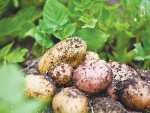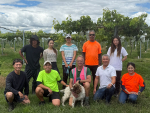An online platform available to New Zealand orchardists through their industry bodies has the potential to lift productivity and save growers thousands of dollars in lost crops.
That’s according to Central Otago orchard manager Pete Bennie, who uses the MetWatch platform multiple times a day to improve the way he manages the Leaning Rock Cherries orchard near Alexandra. The orchard includes 50 hectares planted in cherries, apples, apricots, peaches and nectarines. It has steadily grown in the time Bennie has run it.
He puts part of Leaning Rock’s success down to the MetWatch platform, which provides access to a swathe of data that supports his daily decision making. Bennie accesses the platform through his membership of New Zealand Apples & Pears and Summerfruit New Zealand – viewing different fruit-specific forecasts and disease models through each organisation’s online portal.
“I’m using it regularly at the start of every apple growing season looking at the probability of frost,” he says. “And then as we get into November and December, I’m using it to understand disease threat, rainfall and when I need to irrigate.”
Developed by New Zealand agritech company Hortplus, MetWatch draws on a network of weather stations around the country to provide accurate weather forecasting and help growers understand trends and manage risks posed by pests and diseases.
It combines real-time environmental data from the weather stations with pest and disease models developed by some of New Zealand’s leading researchers to provide user-friendly insights that help orchardists and agronomists make smart science-based decisions.
Bennie says the portal is a valuable tool, which he logs in up to three times a day from the office or while in the field. He says the insights it provides have saved him a significant amount of money through reduced crop losses, and as a result of better-informed decisions about when to bring in a helicopter as a frost control measure or for cherry drying.
“Helicopters are effective for frost control or drying cherries but they cost a bit so you need to be sure before you use one.”
With summer, the warmer weather can cause reduced productivity and disease. This is particularly true during a Central Otago summer, when water management becomes critical.
Bennie reckons tools like the portal can give orchardists an edge. He says the result is more fruit, healthier fruit, and less lost fruit – all of which add to profitability.
Keeping Diseases At Bay
MetWatch's other handy grower tools are its disease models.
These include botrytis, leaf rust, brown rot on the Summerfruit New Zealand Weather and Disease portal, and black spot and many others on the New Zealand Apples & Pears Weather and Disease Portal.
“The black spot model – that’s gold. If the portal says the risk level is high,” Bennie explains. “I know I need to consider spraying lime sulphur or using overhead sprinklers.”
MetWatch was first made available to the apple and pear industry in 2010 and the summerfruit industry in 2019. The MetWatch platform is also available through industry bodies for arable crops, kiwifruit and onions – with different tools and crop-specific pest and disease models for each. It is not only used by growers, but also by researchers and agronomists for more advanced modelling and data insight.
Apple and pear growers can access it through an online portal available to members of New Zealand Apples & Pears, while growers of summerfruit can access it through an online portal available to members of Summerfruit New Zealand.
Growers in other industries may access MetWatch either through a corporate account, or via online portals made available by their industry association, enabling industry-specific tools and models.


















